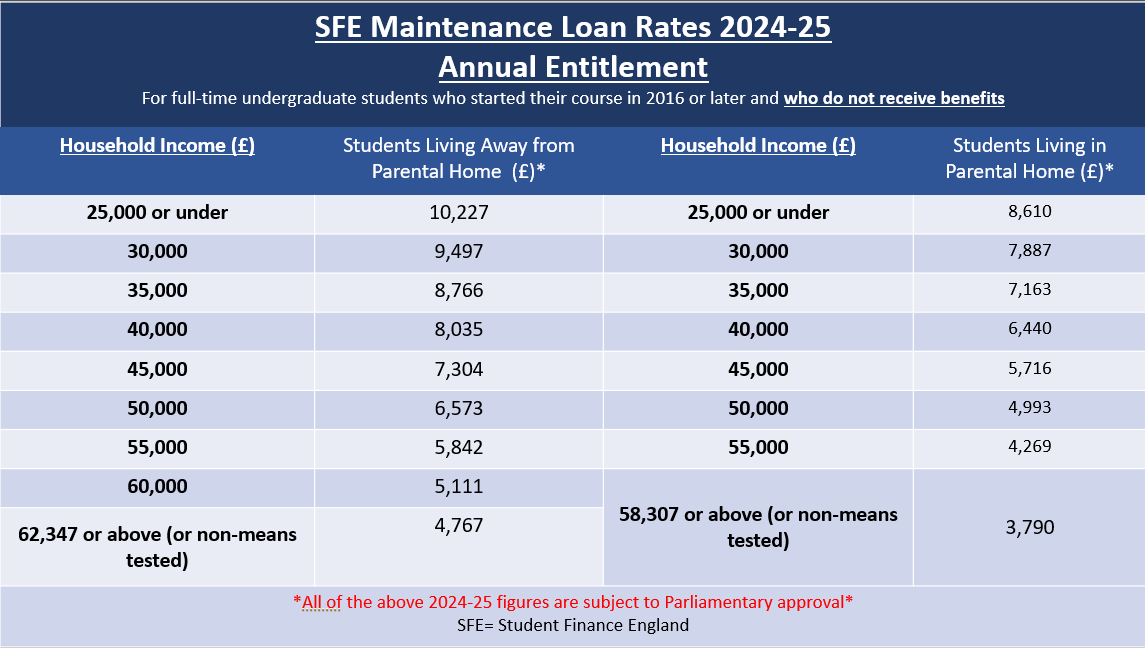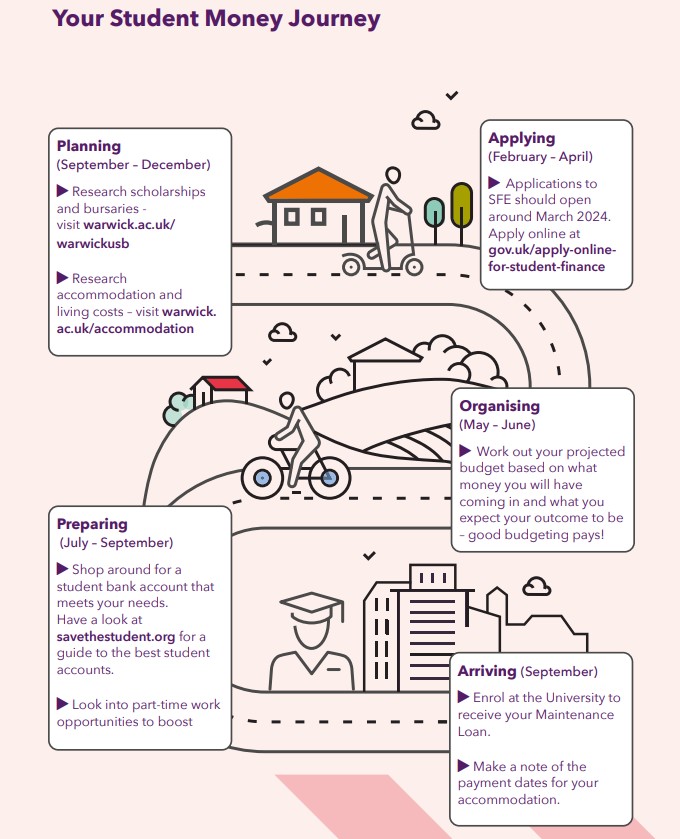Full-time Undergraduate Funding - 2024 Entry
Funding Information:
- Tuition Fees
- UK Government Student Loans
- Applying to Student Finance England (SFE) for the Tuition Fee and Maintenance Loans
- Repaying the Tuition Fee and Maintenance Loans
- Disabled Students' Allowance
- Dependants' Grants
- Bursaries and Scholarships
- Living Costs, Course Costs and Budgeting
- Top Money Tips
- Student Money Journey
- Useful Links

Tuition Fees
Tuition Fees for full-time undergraduates in 2024-25 are £9,250. The University may increase fees in line with any inflationary uplift as decided by the UK Government in subsequent years of your course. It is expected that such increases will be linked to the Retail Price Index (RPI excluding mortgage interest payments).
Eligible students can receive a Tuition Fee Loan to cover the cost of the fees in full. For more information please see the below Tuition Fee Loan section. It is not mandatory to take out a Tuition Fee Loan. If you do not want to take out a Tuition Fee Loan and want to pay for your Tuition Fees yourself please see the following relevant webpages from the University's Student Finance Team:
UK Government Student Loans
You may be eligible for student loans from the UK Government (Tuition Fee Loan and Maintenance Loan). Eligibility for student loans will depend on certain criteria, such as your nationality and residency status. You can view the full criteria at Student Finance for Undergraduates -Eligibility.
If you are unsure whether you qualify for these student loans, you can Contact Student Finance EnglandLink opens in a new window directly to clarify.

Tuition Fee Loan
- A non-means tested Tuition Fee Loan is available from Student Finance England (SFE).
- Eligible students will be able to apply for and take out the full amount of Tuition Fee Loan required to pay their Tuition Fees in full regardless of their household income.
- The Tuition Fee Loan is paid directly to the University to cover the cost of your fees in termly instalments.
- As it is a loan, you will need to repay it.
- You need to apply for this for every year of study.

Maintenance Loan
- Eligible students can apply to SFE for a Maintenance Loan towards their living and course costs.
- The Maintenance Loan is means-tested so the amount you receive is partially based on your household income and whether you chose to live in or away from your parental home.
- The Maintenance Loan is paid in equal termly instalments.
- As it is a loan, you will need to repay it.
- You need to apply for this for every year of study.
Maintenance Loan Entitlement
Eligible students can apply to Student Finance England (SFE) for a partially means-tested Maintenance Loan to contribute towards their living and course costs.
For the 2024-25 academic year, household income will be taken from the 2022-23 tax year and will depend on the people you live with: your parent(s)/carer(s), your parent/carer and their partner or your partner.
- In certain circumstances, your assessment might be based on your own income, for example, if you are aged over 25 at the start of your course.
- For more information on taxable income check out the GOV.UK webpage, Income Tax- Introduction.
- You can get an estimate of how much Maintenance Loan you may be eligible for by using the Student Finance CalculatorLink opens in a new window

If there has been a drop in your household income of 15% or more since the 2022-23 tax year, you should notify Student Finance England once you have applied for a maintenance loan, as you may be entitled to an increased entitlement. For more information see the following webpage, Support your Child or Partner's Student Finance Application - If your income has gone down.
Please see our separate webpage, Students Eligible for Benefits or Aged 60 or OverLink opens in a new window if you will be aged 60 or over on the first day of the first year of your course or if you receive government benefits, for the funding information relevant to you.
The amount of maintenance loan you may be eligible for may differ during a Study Abroad opportunity. Please visit our Study Abroad webpage for further information.
Applying to Student Finance England (SFE) for the Tuition Fee and Maintenance Loans
Applications for student loans are made online, see the Student Finance England - How To Apply webpage for more information. Applications for the 2024-25 academic year are expected to open in March 2024. You should apply as soon as possible to make sure that your funding is in place for the start of your course. The application takes about 30-45 minutes and you apply for both the Tuition Fee and Maintenance Loan in one application. You will need to apply for each year that you require a Tuition Fee Loan and/or a Maintenance Loan.
Repaying the Tuition Fee and Maintenance Loan
- Repayments will begin in April after you have completed or left your course.
- Repayments will start only when your income is over £25,000 per year (threshold from August 1 2023 - Plan 5 Student Loan).
- You will repay 9p for every £1 you earn over the £25,000 threshold.
- Repayments are deducted automatically through the tax system. If you are self-employed or working overseas when your repayments are due to start, you will need to arrange separate repayment arrangements with Student Finance England.
- If your income falls below the £25,000 threshold repayments will stop automatically and not re-start until you are earning over the threshold again. If you are self-employed or working overseas while making repayments and your income falls below £25,000, you will need to contact Student Finance England directly.
- There are no early repayment penalties and you can choose to make voluntary repayments to your loan at any time.
- Any outstanding loan (including interest) is written off after 40 years or if you become permanently unfit for work or die.
- Interest is applied to your loan at the point the first payment is made to you and is linked to the Retail Prices Index (RPI).
For more information, please see the gov.uk webpage, Repaying Your Student Loan.
Disabled Students' Allowance (DSA)
If you have a disability, long-term health condition, mental health condition or specific learning difficulty there is additional non-repayable support available.
- DSA is a non-repayable grant offered by SFE.
- DSA is intended to help with any disability-related costs you might have.
- Any support you receive will be based on your individual needs, not your household income.
- Full-time undergraduates can apply for DSA in the same online application form that they complete for their Tuition Fee and Maintenance Loans.
- Make sure you apply early for DSA as applications can take up to 14 weeks as you will need to undertake a Study Needs Assessment.
- For more information on the support provided, the evidence required and how to apply check out SFE's Disabled Students' Allowance webpage and/or the University's Disability Team's Applying for DSALink opens in a new window webpage. Within the University's Disability webpage, you will also find a DSA Eligibility CheckerLink opens in a new window tool which you can use to see whether you may be eligible for DSA.
Dependants' Grants
If you are financially responsible for a child or adult, you may be eligible for a non-repayable grant from Student Finance England. There are three grants available:
- Childcare Grant (CCG)
- Parents' Learning Allowance (PLA)
- Adult Dependants' Grant (ADG)
You can apply for these grants in the same online application as your Tuition Fee and Maintenance Loan. If you have already submitted your loan application and want to subsequently apply for a Dependants' Grant, please see the Student Finance Application for Dependants Grants webpage. For more information, please see our Dependants' GrantsLink opens in a new window webpage.
Bursaries and Scholarships
Bursaries and Scholarships can be a great way to top up your income at University. The University of Warwick offers Bursaries and Scholarships to students for a variety of reasons
The Warwick Bursary is awarded based on household income, as assessed by Student Finance England (SFE), to eligible full-time home undergraduate students with a household income of £35,000 or under. Eligible students can receive up to £2,000 per academic year paid directly to their bank account in termly instalments. Eligible students who meet further criteria (such as students in receipt of Disabled Students' Allowance) can also receive the £1,000 Additional Bursary (on top of their main Warwick Bursary) paid directly to their bank account in term 2.
For more information about the Warwick Bursary and the Additional Bursary, please see our webpage, The Warwick Bursary - 2024 Entry.
For further information about other Bursaries and Scholarships offered by the University of Warwick, please see our Bursaries and ScholarshipsLink opens in a new window webpage.
Living Costs, Course Costs and Budgeting at University
We have dedicated webpages about managing, making, and saving money on our Money Matters sub-section. Here you can find out about Living and Course CostsLink opens in a new window, Budgeting Link opens in a new windowand more!
Top Money Tips
Check out our top money tips below!

You can find more tips and ideas at Money Matters.
Student Money Journey
Below is a summary of your Student Money Journey to university.

Planning:
Applying:
Preparing:

